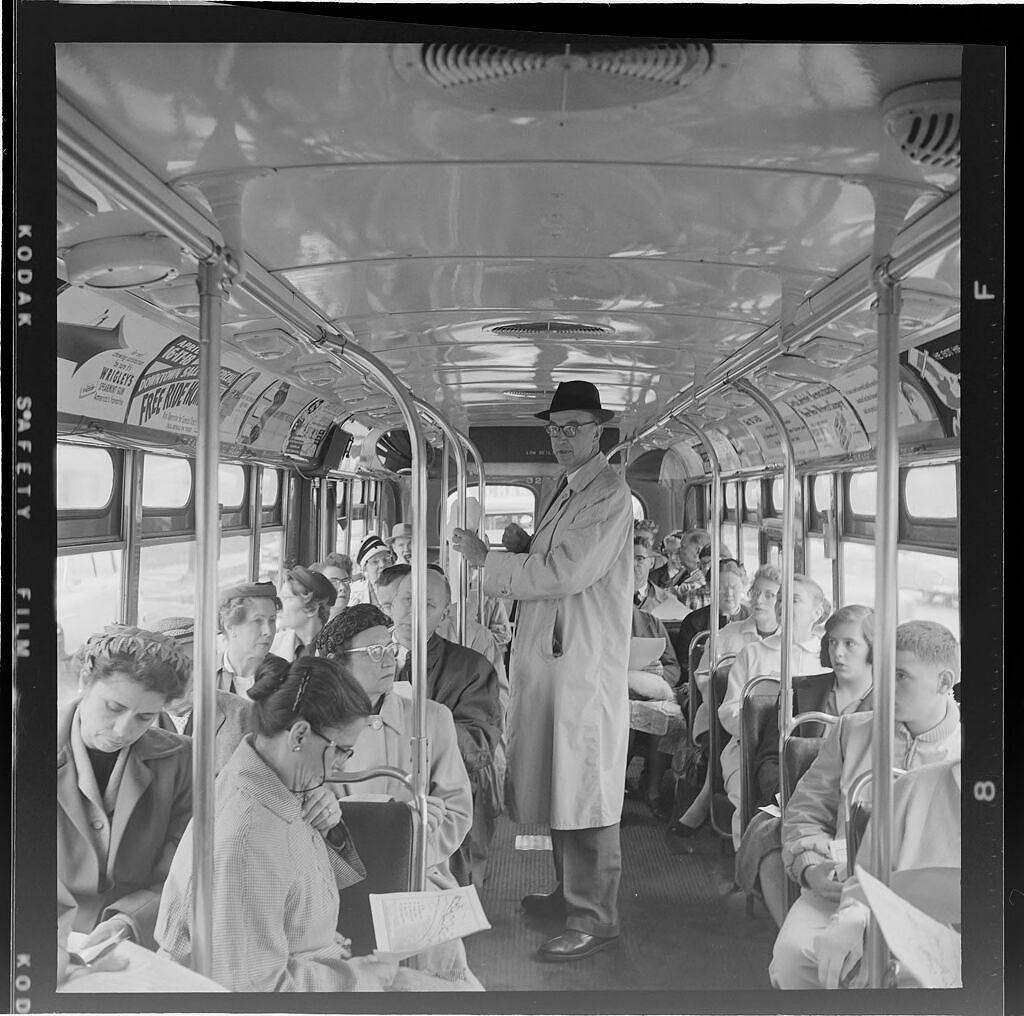RidingBus

Jack Gould: Untitled [passengers on crowded city bus] (c. 1950)
" … prefer to wait on the corner for their next ride to anywhere."
The Grand Other enrolled in a new school this term, so her last year's school bus routine wouldn't get her there. She'd have to ride the city bus, something with which she had zero experience. Further, her older sister had filled her with stories about how rough the city bus could be, so she was understandably hesitant even to try that ride. Her mom and dad both went to work long before The Other would have to leave for school, so she was left with a dilemma. Fortunately, her grandfather is an enthusiastic bus rider, and seeing opportunities to engage in one of his favorite activities, he volunteered to introduce her to the lifestyle.
I consider RidingBus to be a lifestyle, a choice. I rode buses to work when I worked in downtown Portland. My employer subsidized the fare, and it was much handier than driving and paying through both nostrils for parking. I could stroll to a corner a scant two blocks from my front door where a bus passed every ten or fifteen minutes, so frequently that I never needed to care about the schedule. Once on board, I could study up for the day or, more likely, read my Harper’s magazine, chauffeur-driven. Downtown, I'd hop a shuttle up the Mall, which would drop me off right at my building. Commuting was never easier or more enjoyable.
The bus route was closed for road improvement work the first three weeks of the semester, so I drove The Other to school. Her mother would fetch her at the end of the day, and it continued until yesterday. Finally, the road work was finished, and the transit website promised service. I'd tasked The Other with some homework. She would discover the schedule and direct us to where the bus might find us. I'd just go along for the ride and offer etiquette advice. Novices don't understand the ethics of RidingBus. There are rules, largely unwritten and unenforceable by the harried bus driver, but nonetheless well worth observing. They amount to common decencies that, once understood, can't fail to offend when they're missing.
They're few: One always takes a seat in the way back rather than near the front door so that geezers like me can take the seats that don't require much exertion. Those still young and full of hope climb to the back. Also, there's never any eating or drinking on any bus. It's unseemly. It's the cause of sticky seats and other troubles. Nobody ever needs anybody to spill their latte on a seat, and nobody has the means to clean up even inadvertent spills. If an elder can't find a seat, it's your job to offer yours. This simple practice keeps the world square to its horizon. Finally, welcome the driver when boarding and thank them as you exit. Common decency keeps the buses decent.
We made it to school with a few minutes to spare that first morning. I returned in the afternoon to ride along with her back home. Once we'd arrived, she announced to her folks that I would not be welcome to ride with her after tomorrow. I'd come the following morning and return that evening, but that would end my bus-riding lessons. I'd been watching, and she seemed to have mastered the business. I asked her if she enjoyed the rides, and she replied that she wished they were longer. We met a friendly cat on the way from the bus stop to school, and the neighborhood seemed even friendlier the second morning. I was reveling in riding clear across town without lifting so much as a finger. I feel as though I successfully passed on the practice to her.
Since moving back to this small city, I've sorely missed my dependence on public transportation. It's a real leveler. It might be impossible to get too full of yourself if you're rubbing shoulders with your fellow citizens morning and evening. In smaller towns, we mostly get around in isolation, missing those opportunities to spread our humanity around. The Other learned that most of the others on her bus route were heading to her school, too. She even knew one of them, though he wasn't a friend. "He always smells like urine," she declared, "though I try not to embarrass him when he talks to me." That's the attitude I was hoping to see.
At a family gathering last weekend, The Other declared that she liked her new school. None of her family had heard her declare such a thing since she left fourth grade. A high school freshman now, she had been running out of time to find a reason to like school, and the prior few years had been truly horrible, with too many absences and incompletes. Her new independence might help anchor this renewed experience. I helped a little bit, but I'm convinced that if everybody tried riding the bus and understood its ethics, everyone would prefer to wait on the corner for their next ride to anywhere.
©2024 by David A. Schmaltz - all rights reserved


